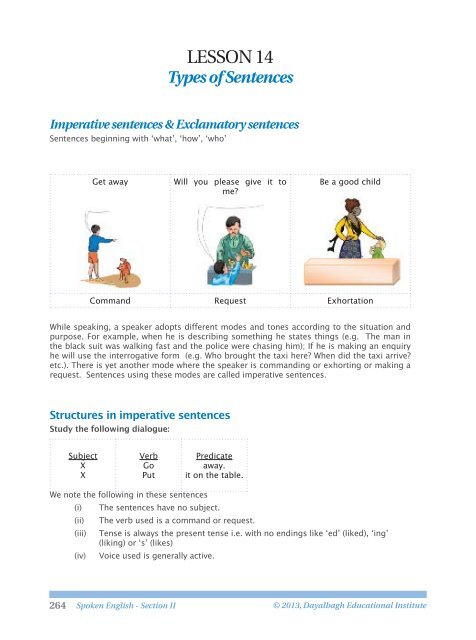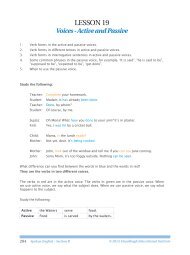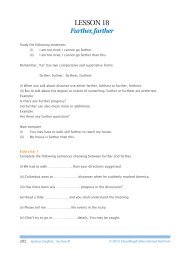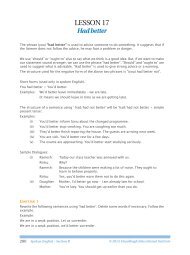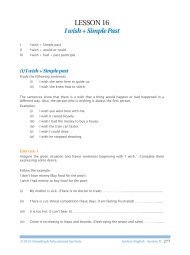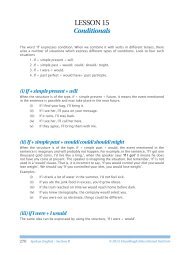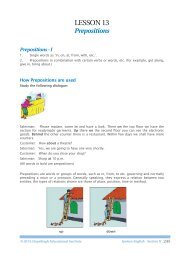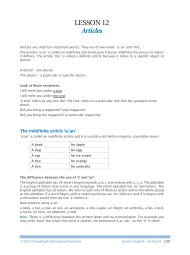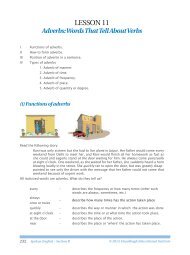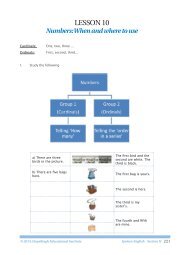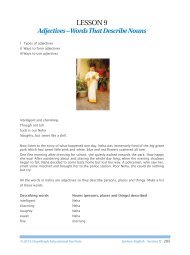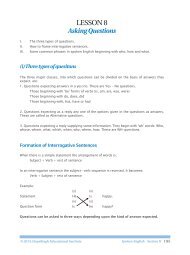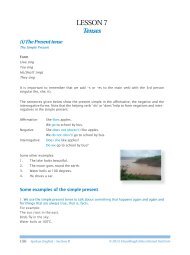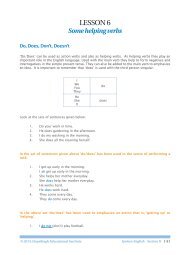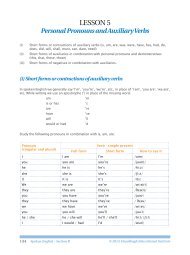SpokenEnglish-Sec2-Lesson14
You also want an ePaper? Increase the reach of your titles
YUMPU automatically turns print PDFs into web optimized ePapers that Google loves.
LESSON 14<br />
Types of Sentences<br />
Imperative sentences & Exclamatory sentences<br />
Sentences beginning with ‘what’, ‘how’, ‘who’<br />
Get away<br />
Will you please give it to<br />
me?<br />
Be a good child<br />
Command Request Exhortation<br />
While speaking, a speaker adopts different modes and tones according to the situation and<br />
purpose. For example, when he is describing something he states things (e.g. The man in<br />
the black suit was walking fast and the police were chasing him); If he is making an enquiry<br />
he will use the interrogative form (e.g. Who brought the taxi here? When did the taxi arrive?<br />
etc.). There is yet another mode where the speaker is commanding or exhorting or making a<br />
request. Sentences using these modes are called imperative sentences.<br />
Structures in imperative sentences<br />
Study the following dialogue:<br />
Subject<br />
X<br />
X<br />
Verb<br />
Go<br />
Put<br />
Predicate<br />
away.<br />
it on the table.<br />
We note the following in these sentences<br />
(i) The sentences have no subject.<br />
(ii) The verb used is a command or request.<br />
(iii) Tense is always the present tense i.e. with no endings like ‘ed’ (liked), ‘ing’<br />
(liking) or ‘s’ (likes)<br />
(iv) Voice used is generally active.<br />
264 Spoken English - Section II © 2013, Dayalbagh Educational Institute
(v)<br />
(vi)<br />
There is no use of modal auxiliaries such as can, could, will, would, shall, must,<br />
need.<br />
These can be affirmative or negative, that is. in their ‘yes’ or ‘no’ form.<br />
Forms of command<br />
I Simple commands<br />
(i) Come and sit here.<br />
(ii) Keep standing.<br />
(iii) Bring your book.<br />
(iv) Don’t make any noise.<br />
(v) Get up and leave the room.<br />
II Command in the form of request – adding the word of request in the beginning<br />
or at the end of the sentence<br />
(i) Please do it fast.<br />
(ii) Get away from here please.<br />
(iii) Don’t irritate me anymore, please.<br />
(iv) Leave me alone, please.<br />
(v) Please leave me to myself.<br />
III<br />
Commands or requests in interrogatives<br />
(i) Will you go away from here?<br />
(ii) Do you mind leaving me alone, please<br />
IV Commands in which second person is retained<br />
These commands are admonitory in tone and express extreme irritation hence, they do not<br />
combine polite words such as ‘please’.<br />
You mind your own business. Leave me alone.<br />
You are nobody to advise me.<br />
(Read loudly using the correct intonation)<br />
(i) Daughter: Mother, can we go for a picnic today?<br />
Mother:<br />
Leave me alone. Let me finish my work.<br />
(ii) Daughter: Why can’t you get a typist to do your work? You unnecessarily tire<br />
yourself.<br />
© 2013, Dayalbagh Educational Institute<br />
Spoken English - Section II<br />
265
Mother : Mind your own business. I don’t need your advice.<br />
(iii) Student : Sir, please help me solve these sums.<br />
Teacher: How many times I have told you not to disturb me.<br />
Student : Please, Sir, give me just half an hour.<br />
Teacher: Will you please go away from here. Don’t irritate me anymore.<br />
V Commands with Let<br />
Such commands are in the form of exhortations or advice:<br />
(i) Let us work hard.<br />
(ii) Let us wait and watch.<br />
(iii) Let each man think for himself.<br />
(iv) Let all the students reach in time<br />
(v) Let us pray for the soldiers fighting for us.<br />
(vi) Let there be no fights among us.<br />
VI<br />
Negative commands<br />
Positive<br />
Negative<br />
(i) Open the door. Don’t open the door.<br />
(ii) Move the chairs. Don’t move the chairs.<br />
(iii) Let anyone do it. Don’t let anyone do it.<br />
(iv) Come in. You dare come in.<br />
(v) Sit down. Keep standing. There’s no need to sit<br />
down.<br />
Exclamatory Sentences<br />
An exclamatory sentence expresses a sudden feeling or emotion –<br />
(i) Hurrah! We have won the match. (Joy)<br />
(ii) Alas, I am left alone. (Grief)<br />
(iii) Ah! What a joy to have you here. (Surprise)<br />
(iv) Bravo! Keep it up. (Approval)<br />
Other expressions can be – gracious me, how wonderful, well done etc.<br />
Exclamatory Sentences with ‘What or How + noun phrase?<br />
(i) What a wonderful day we had!<br />
(ii) How nice to see you!<br />
(iii) What a surprise to see you after so long!<br />
(iv) How wonderful everything is here!<br />
266 Spoken English - Section II © 2013, Dayalbagh Educational Institute
(v)<br />
(vi)<br />
How foolish of you to do this!<br />
How dirty it is!<br />
Points to note:<br />
1. In such sentences the exclamation follows much the same pattern as that of ‘Wh’ questions.<br />
For example, in the sentence ‘What a surprise!’ the pattern is similar to that of an interrogative<br />
sentence yet it is not a question, but an exclamation.<br />
2. In sentences, that use expressions such as ‘What a day!’, it is not clear whether the<br />
speaker is expressing dislike or appreciation. The context and speaker’s tone will convey the<br />
feeling.<br />
3. The question words are placed initially.<br />
How to convert a statement into an exclamatory sentence<br />
•Statement - We had` a good / bad time<br />
Exclamatory - What a time we had!<br />
•Statement - Her voice is very pleasant<br />
Exclamatory<br />
How pleasant her voice is!<br />
•Statement - I used to hate science.<br />
Exclamatory<br />
How I hate science!<br />
•Statement - We’re in a mess.<br />
Exclamatory<br />
What a mess we’re in!<br />
•Statement - That is an enormous tree.<br />
Exclamatory - What an enormous tree that is!<br />
Sample conversation - Dialogue between two friends<br />
Ravi: Dinu, why are you so worried? How hard you have worked throughout the year. I<br />
am sure you are going to get a high percentage.<br />
Dinu: Who knows what the future holds!<br />
Ravi: But what a time it has been for you - studying from morning till night without<br />
bothering about food or rest.<br />
Dinu: I don’t know. But, I can never forget what a mess it has been! The night before<br />
examination I was so tense. How much I hated history!<br />
Ravi: Don’t worry! All is well that ends well. Let us hope for the best<br />
© 2013, Dayalbagh Educational Institute<br />
Spoken English - Section II<br />
267
Exercise 1<br />
Frame commands / requests suitable to the given situations:<br />
Example:<br />
Teacher asking the students to finish their work.<br />
Finish your work immediately.<br />
(i) Mother asking son to study. …………..........…<br />
(ii) You do not want to go to a movie. ……………..........<br />
(iii) Teacher telling the students to stop making noise. ……………..........<br />
(iv) There is delay in the execution of the order. ……………..........<br />
(v) You are irritated by the repeated requests of a subordinate. ……………..........<br />
Exercise 2<br />
Frame sentences with ‘let’ expressing the suggested feelings / ideas<br />
(i) All get success. ……………..............................………<br />
(ii) Love among all ……………..............................………<br />
(iii) Do our duties sincerely ……………..............................………<br />
(iv) Not trouble anyone. ……………..............................………<br />
Exercise 3<br />
Complete the following sentences adding negative commands. Use the words given against<br />
each in parenthesis:<br />
(i) It is too hot. (not to go out) ……………..............................<br />
(ii) It is too costly. (not to purchase it) ……………..............................<br />
(iii) Exams are too close. (not to waste time) ……………..............................<br />
(iv)<br />
He must be sleeping. (not to go to his house) ……………..............................<br />
(v) I am resting. (not to make noise) ……………..............................<br />
268 Spoken English - Section II © 2013, Dayalbagh Educational Institute
Exercise 4<br />
Change the following statements into exclamatory sentences:<br />
(i) It’s a beautiful garden. ……..............................<br />
(ii) She is a pest, always keeps coming here. ……..............................<br />
(iii) It was a surprise to see the Kohinoor. ……..............................<br />
(iv) She dares talk to me like this. ……..............................<br />
(v) They are so obstinate. They never listen to me. ……..............................<br />
Answers to Exercise 1<br />
(These answers are only suggestive. Learners can frame their own also.)<br />
(i) Sunny, Why can’t you sit down and study / Don’t waste time, sit down and study.<br />
(ii) Please leave me alone. I don’t want to go anywhere.<br />
(iii) Behave yourself. Stop making noise.<br />
(iv) Why so much delay. Hurry up.<br />
(v) Don’t make me say again and again. Please go out and leave me alone.<br />
Answers to Exercise 2<br />
(i) Let everyone succeed in his effort.<br />
(ii) Let there be love among all.<br />
(iii) Let everyone do one’s duty sincerely.<br />
(iv) Let us not trouble anyone.<br />
Answers to Exercise 3<br />
(i) Don’t go out, it’s too hot.<br />
(ii) Don’t purchase it, it’s too costly.<br />
(iii) Don’t waste your time, the exams are too close.<br />
(iv) Don’t go to his house, he must be sleeping.<br />
(v) Don’t make noise, let me rest.<br />
Answers to Exercise 4<br />
(i) What a beautiful garden it is.<br />
(ii) What a pest she is, always keeps coming.<br />
(iii) What a surprise it was to see the Kohinoor.<br />
(iv) How dare she talk to me like this.<br />
(v) How obstinate they are, never listen to me.<br />
© 2013, Dayalbagh Educational Institute<br />
Spoken English - Section II<br />
269


